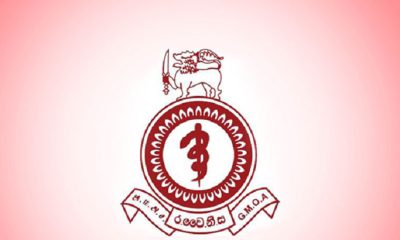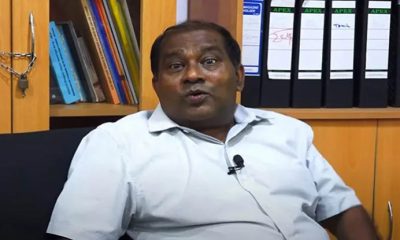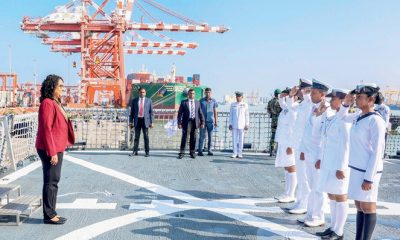Features
Easter Sunday Bomb Attack on April 21, 2019:
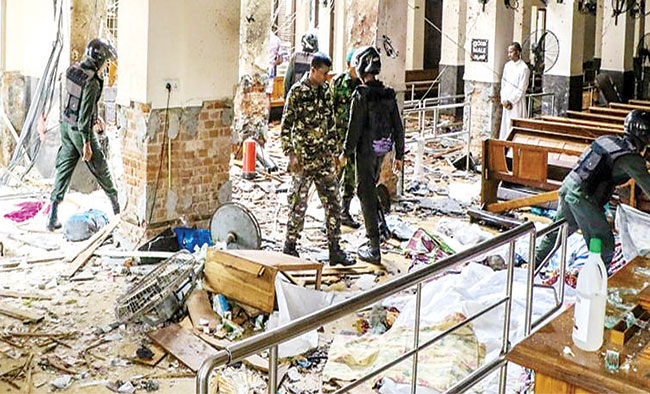
The author is a staunch advocate of police reforms and was one of those who contributed to the proposal put up by the OPA in 2001 that brought some police reforms in the form of the 17th Amendment to the Constitution.
In Retrospect
By Dr. Kingsley Wickremasuriya
Senior Deputy Inspector- General of Police (Retd)
E-mail: kingsley.wickremasuriya@gmail.com
Prologue
It is more than two years since the infamous bomb attack on civilian targets in Colombo, Negombo, and Batticaloa took place on Easter Sunday, 2019. Now that the dust from the political fallout from the incident is almost settling down (or is it?) it would be opportune to look back at the events that took place dispassionately removed from a politically charged environment. Undertaking such a task is particularly pertinent in view of the lingering protests and statements made by the Catholic Church representing the victims expressing fears that there would be a repetition of the violence.
Although many theories have been advanced in the public domain as to who is responsible for the failure to prevent the attack on Easter Sunday, prima facie it would seem that the failure is a clear Neglect of Duty on the part of the police, PREVENTION being its mandatory duty in terms of Section 56 of the Police Ordinance No 16 of 1866. However, looking at it from a practical point of view, invoking Section 56 alone is not realistic. Before coming to any conclusion as to where the final responsibility rests, the incident has to be analyzed in the background of many intervening socio-political factors that have intruded into the body politic of the country since the enactment of this law.
Accordingly, based on what is reported in the media on the instant case, the author would argue, that what contributed to the violence on that fateful Easter Sunday, was more a system failure than deliberate criminal negligence. Going on this premise he would venture to suggest a methodology that could prevent a repetition of another Easter Sunday.
Easter Sunday Attack
Wikipedia reported that , April 21, 2019, a series of Islamic bombings targeted three (St. Anthony’s Church, Katuwapitiya Church, a Church in Batticaloa, and three luxury hotels (the Kingsbury, Shangri-La, and Cinnamon Grand) in the country’s commercial capital, On the same day, minor explosions were reported at an apartment complex in and a lodge in At least 277 people were killed and more than 500 were injured, including at least 45 foreigners, three police officers, and eight bombers during the incident. According to the State Intelligence Service, the second series of raids were planned but were successfully stopped as a result of government raids.
Further, it is reported that all eight bombers were Sri Lankan nationals and affiliates of the . group suspected of having foreign links and has previously targeted and told parliament on April 23 that the government believed the attack was in retaliation for the March 15, 2019 attack on . However, the Tawheed Jamaat has been collecting explosives since January 2019.
While this was the local reaction, at the international level, the United Nations in Sri Lanka responded to the incident by strongly condemning the attacks against civilians carried out in places of worship and city hotels on Easter Sunday and urging the authorities, and all citizens to ensure that the rule of law is upheld.
Police Taken to Task
In the meanwhile, on Monday, November 22, 2021 ‘The Hindu’ reported that, following investigations, Sri Lanka’s former police chief was charged with criminal negligence for failing to act despite receiving prior intelligence warnings in the 2019 Easter Sunday terror attack that killed nearly 270 people, including 11 Indians. A total of 855 charges of criminal negligence were leveled against him as the Sri Lankan High Court began trial proceedings in the case, which has over 1,200 witnesses, according to the lawyers.
The ex-police chief on the other hand has told a panel probing the attack, that the former Sri Lankan President should take responsibility for the 2019 Easter Sunday bombings that claimed the lives of over 250 people, according to media reports.
Courts acquit the Police
The police chief was finally freed after a lengthy Trial at Bar on February 18, 2022 when the Colombo Permanent High Court Trial-at-Bar ordered his acquittal and release from all charges filed against him over the Easter Sunday attacks without even calling for evidence from the Defense, reported News First. If the High Court Bench have found the Inspector-General not guilty, then it is pertinent to ask the question as to who should be held responsible for the failure to prevent the carnage?
Lines of responsibility
It is a well-known fact that the police since its inception worked on the basic principle of law as given in ‘The Police Ordinance No 16 of 1866’ that “Every police officer shall for all purposes in this Ordinance contained be considered to be always on duty, and shall have the powers of a police officer in every part of Sri Lanka“. While the police in keeping with the principle of Separation of Powers draw this power from Parliament (the PEOPLE), and are held responsible to the Courts of Law (who have the power of review over the police) for the exercise of those powers, the administration of the police is vested in the Inspector-General of Police (Section 20) and policy making in the hands of the Minister (Sections 3,4,5,6,9 & 10) following on the same principle.
Further, Section 56 makes it obligatory on the part of every police officer that:
“It shall be his duty
(a) to use his best endeavors and ability to prevent all crimes, offences, and public nuisances;
(b) to preserve the peace;
(c) to apprehend disorderly and suspicious characters;
(d) to detect and bring offender s to justice;
(e) to collect and communicate intelligence affecting the public peace; and
(f) promptly to obey and execute all orders and warrants lawfully issued and directed to him by any competent authority.”
Thus, the lines of authority and responsibility drawn vis a vis the police are clear and unambiguous in law.
How the System Worked
For administration purposes the Island is divided into Police Stations, Districts, Divisions and Ranges. Police station is one of the first bulwarks of democratic government dispensing services to the community at grassroots level. Police station being the basic unit of security in the country, the Officer in Charge (OIC) of the police station played a key role in the System in maintaining law and order. In practical terms, the responsibility started at the Police Station level. The Officer in-charge of the Police (OIC) Station was responsible for securing his area against all threats to public peace. If he failed, the entire System would fail. The OIC naturally had therefore, to take the center stage of the local law and order scene.
In maintaining his position as a key link of the security system in the country, the OIC drew his strength from the Gazetted ranks (ASP & above) in playing his role and looked to his superiors for leadership and personal advancement. This expectation fulfilled, his loyalty never went beyond the Head of the Department, the Inspector-General. So, the SYSTEM worked fairly effectively (in spite of an occasional derailment) and the Police by and large stood their own against any calamity, be it coup d’état, Insurrection or communal violence or even natural disaster.
What went wrong
Although the System worked initially for some time, it was soon overwhelmed by the steadily increasing influence of the Member of Parliament (MP) over time. Various Sessional Papers on Constitutional Reforms reports of the Donoughmore Commission Report (1928), the Soulbury Commission Report (1969) and on Police Reforms such as the Soertz Police Commission Report, Basnayake Police Commission Report(1970)), Subasinghe Committee Report (1978), and Jayasinghe Committee Report (1999) give a detailed account of the gradual encroachment of the System by the MP – first in matters of transfers, promotions etc and then going even to the extent of interfering in police operations like Criminal Investigations.
The three-man Committee headed by Mr. W. T. Jayasinghe, a former Secretary to the Ministry of Defence (1995),
the last committee on Police Reforms describing the extent to which the canker had grown said:
The interference did not stop with personnel matters like transfers, promotions etc.. It extended even to operational matters like criminal investigations. As a result of increasing incidence of interference by MPP in investigations the Committee said that some of the officers who were fair and acted impartially were removed and transferred from their stations overnight at the instance of the MP because the offender happened to be a supporter of the MP, and yet others who had a well-known track record of corruption or inefficiency were promoted over the heads of those conscientious and dedicated officers. They also pointed out how in recent years junior officers have been promoted over their seniors, ostensibly on the ground of outstanding merit. This affected the morale of the entire Service.
These undue pressures were mostly from politicians and those close to politicians. This was one of the main reasons for the breakdown of discipline, loss of morale and high incidence of corruption in the police, the Committee reported.
Thus, Commission after Commission and Committee after Committee reported that the evidence before them showed that there is political interference in the sphere of appointments and promotions. Such interference they said affects the impartial discharge of their duties and consequently their independence. Commenting further, they said that the efficient maintenance of law and order by the Police depends on non-interference with the performance of their duties. This is a prerequisite to the efficient maintenance of law and order. They should have the freedom of performing their duties without the fear of coming under external pressure.
The impact of this continued political onslaught on the police by those in power was subversion of the police into a feudal instrument of political subservience waiting for ’Orders from Above’ (resulting in the abdication of responsibility) than an organization providing services to the community in a democracy according to the Rule of Law. Easter Sunday attack, one cannot therefore rule out, is a direct outcome of this process.
Had it not been the case, I would imagine that the first officer to be on the scene before the attack would have been the OICC of the concerned police stations who would have communicated and shared the information (intelligence) in their possession with the Church/ hotel authorities – the mandatory duty laid down by Section 56 of the Police Ordinance. Having done that, I would imagine that they would have gone further and either posted officers in uniform overtly at the concerned sites or taken other measures like establishing check points or going even to the extent of getting the church services for the day canceled in consultation with the authorities concerned in order to deter any attacks. They could even have considered calling for a local curfew with the support of their superiors instead of waiting for orders from above.
Conclusions
Politicians’ interest in government business in this country is not a new phenomenon. It has been in existence ever since the establishment of constitutional government and the introduction of democratic institutions in Ceylon. Such interest however, is a healthy sign of a vibrant democracy. The author recognizes this development as such and the legitimate right and the duty of the elected representative to represent matters about his electorate and its constituents.
Similarly, he also recognizes the responsibility that an elected Government has towards its constituency and its accountability to the country for its actions through the government machinery and the need to implement its policy through that machinery effectively. But what is of concern here is how undue political pressure brought to bear by elected representatives of the people on those in public service in matters other than policy has been detrimental to Good Governance, Democracy and Rule of Law and how it had led to inefficiency, corruption and inaction in the Public Service. Police are no exception.
Police in a Democracy are an institution responsible for maintaining safety and security of the citizen according to the rule of law. Impartial police therefore are a sine-qua-non-if they are to ensure a just & a peaceful society. Their commitment should ideally be to serve the community “for the happiness of the many, for the welfare of the many” – bahu jana hithaya, bahu jana sukhaya. Any compromise of the role of the police beyond his legal position is bound with calamitous results as we have seen in the case of Easter Sunday attack. Therefore, if we are to prevent a repetition of another Easter Sunday in the future, political tinkering with the police and their impartiality is what must be guarded against at all costs. The way towards achieving the desired end is through repeated police reforms from time to time.
The last Commission sitting on police reforms publicly was the Basnayake Police Commission (1970) – half a century back. Others were only Committees (last Committee sitting in 1999) with a limited scope. Much water has passed under the bridge since then. Police as well as the Community had to grin and bear their grievances without a chance being given to come out with them – particularly the police who have no Trade Union Rights. It is therefore, time to call for police reforms, a task that is best left to the leadership of civil society.
BHAVATU SABBA MANGALAM.!! MAY ALL BEINGS BE HAPPY!!
Features
Disaster-proofing paradise: Sri Lanka’s new path to global resilience
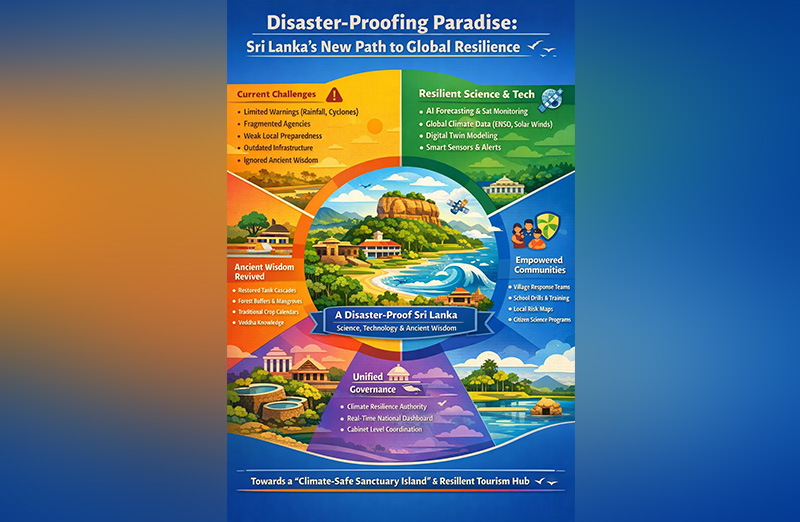
iyadasa Advisor to the Ministry of Science & Technology and a Board of Directors of Sri Lanka Atomic Energy Regulatory Council A value chain management consultant to www.vivonta.lk
As climate shocks multiply worldwide from unseasonal droughts and flash floods to cyclones that now carry unpredictable fury Sri Lanka, long known for its lush biodiversity and heritage, stands at a crossroads. We can either remain locked in a reactive cycle of warnings and recovery, or boldly transform into the world’s first disaster-proof tropical nation — a secure haven for citizens and a trusted destination for global travelers.
The Presidential declaration to transition within one year from a limited, rainfall-and-cyclone-dependent warning system to a full-spectrum, science-enabled resilience model is not only historic — it’s urgent. This policy shift marks the beginning of a new era: one where nature, technology, ancient wisdom, and community preparedness work in harmony to protect every Sri Lankan village and every visiting tourist.
The Current System’s Fatal Gaps
Today, Sri Lanka’s disaster management system is dangerously underpowered for the accelerating climate era. Our primary reliance is on monsoon rainfall tracking and cyclone alerts — helpful, but inadequate in the face of multi-hazard threats such as flash floods, landslides, droughts, lightning storms, and urban inundation.
Institutions are fragmented; responsibilities crisscross between agencies, often with unclear mandates and slow decision cycles. Community-level preparedness is minimal — nearly half of households lack basic knowledge on what to do when a disaster strikes. Infrastructure in key regions is outdated, with urban drains, tank sluices, and bunds built for rainfall patterns of the 1960s, not today’s intense cloudbursts or sea-level rise.
Critically, Sri Lanka is not yet integrated with global planetary systems — solar winds, El Niño cycles, Indian Ocean Dipole shifts — despite clear evidence that these invisible climate forces shape our rainfall, storm intensity, and drought rhythms. Worse, we have lost touch with our ancestral systems of environmental management — from tank cascades to forest sanctuaries — that sustained this island for over two millennia.
This system, in short, is outdated, siloed, and reactive. And it must change.
A New Vision for Disaster-Proof Sri Lanka
Under the new policy shift, Sri Lanka will adopt a complete resilience architecture that transforms climate disaster prevention into a national development strategy. This system rests on five interlinked pillars:
Science and Predictive Intelligence
We will move beyond surface-level forecasting. A new national climate intelligence platform will integrate:
AI-driven pattern recognition of rainfall and flood events
Global data from solar activity, ocean oscillations (ENSO, MJO, IOD)
High-resolution digital twins of floodplains and cities
Real-time satellite feeds on cyclone trajectory and ocean heat
The adverse impacts of global warming—such as sea-level rise, the proliferation of pests and diseases affecting human health and food production, and the change of functionality of chlorophyll—must be systematically captured, rigorously analysed, and addressed through proactive, advance decision-making.
This fusion of local and global data will allow days to weeks of anticipatory action, rather than hours of late alerts.
Advanced Technology and Early Warning Infrastructure
Cell-broadcast alerts in all three national languages, expanded weather radar, flood-sensing drones, and tsunami-resilient siren networks will be deployed. Community-level sensors in key river basins and tanks will monitor and report in real-time. Infrastructure projects will now embed climate-risk metrics — from cyclone-proof buildings to sea-level-ready roads.
Governance Overhaul
A new centralised authority — Sri Lanka Climate & Earth Systems Resilience Authority — will consolidate environmental, meteorological, Geological, hydrological, and disaster functions. It will report directly to the Cabinet with a real-time national dashboard. District Disaster Units will be upgraded with GN-level digital coordination. Climate literacy will be declared a national priority.
People Power and Community Preparedness
We will train 25,000 village-level disaster wardens and first responders. Schools will run annual drills for floods, cyclones, tsunamis and landslides. Every community will map its local hazard zones and co-create its own resilience plan. A national climate citizenship programme will reward youth and civil organisations contributing to early warning systems, reforestation (riverbank, slopy land and catchment areas) , or tech solutions.
Reviving Ancient Ecological Wisdom
Sri Lanka’s ancestors engineered tank cascades that regulated floods, stored water, and cooled microclimates. Forest belts protected valleys; sacred groves were biodiversity reservoirs. This policy revives those systems:
Restoring 10,000 hectares of tank ecosystems
Conserving coastal mangroves and reintroducing stone spillways
Integrating traditional seasonal calendars with AI forecasts
Recognising Vedda knowledge of climate shifts as part of national risk strategy
Our past and future must align, or both will be lost.
A Global Destination for Resilient Tourism
Climate-conscious travelers increasingly seek safe, secure, and sustainable destinations. Under this policy, Sri Lanka will position itself as the world’s first “climate-safe sanctuary island” — a place where:
Resorts are cyclone- and tsunami-resilient
Tourists receive live hazard updates via mobile apps
World Heritage Sites are protected by environmental buffers
Visitors can witness tank restoration, ancient climate engineering, and modern AI in action
Sri Lanka will invite scientists, startups, and resilience investors to join our innovation ecosystem — building eco-tourism that’s disaster-proof by design.
Resilience as a National Identity
This shift is not just about floods or cyclones. It is about redefining our identity. To be Sri Lankan must mean to live in harmony with nature and to be ready for its changes. Our ancestors did it. The science now supports it. The time has come.
Let us turn Sri Lanka into the world’s first climate-resilient heritage island — where ancient wisdom meets cutting-edge science, and every citizen stands protected under one shield: a disaster-proof nation.
Features
The minstrel monk and Rafiki the old mandrill in The Lion King – I

Why is national identity so important for a people? AI provides us with an answer worth understanding critically (Caveat: Even AI wisdom should be subjected to the Buddha’s advice to the young Kalamas):
‘A strong sense of identity is crucial for a people as it fosters belonging, builds self-worth, guides behaviour, and provides resilience, allowing individuals to feel connected, make meaningful choices aligned with their values, and maintain mental well-being even amidst societal changes or challenges, acting as a foundation for individual and collective strength. It defines “who we are” culturally and personally, driving shared narratives, pride, political action, and healthier relationships by grounding people in common values, traditions, and a sense of purpose.’
Ethnic Sinhalese who form about 75% of the Sri Lankan population have such a unique identity secured by the binding medium of their Buddhist faith. It is significant that 93% of them still remain Buddhist (according to 2024 statistics/wikipedia), professing Theravada Buddhism, after four and a half centuries of coercive Christianising European occupation that ended in 1948. The Sinhalese are a unique ancient island people with a 2500 year long recorded history, their own language and country, and their deeply evolved Buddhist cultural identity.
Buddhism can be defined, rather paradoxically, as a non-religious religion, an eminently practical ethical-philosophy based on mind cultivation, wisdom and universal compassion. It is an ethico-spiritual value system that prioritises human reason and unaided (i.e., unassisted by any divine or supernatural intervention) escape from suffering through self-realisation. Sri Lanka’s benignly dominant Buddhist socio-cultural background naturally allows unrestricted freedom of religion, belief or non-belief for all its citizens, and makes the country a safe spiritual haven for them. The island’s Buddha Sasana (Dispensation of the Buddha) is the inalienable civilisational treasure that our ancestors of two and a half millennia have bequeathed to us. It is this enduring basis of our identity as a nation which bestows on us the personal and societal benefits of inestimable value mentioned in the AI summary given at the beginning of this essay.
It was this inherent national identity that the Sri Lankan contestant at the 72nd Miss World 2025 pageant held in Hyderabad, India, in May last year, Anudi Gunasekera, proudly showcased before the world, during her initial self-introduction. She started off with a verse from the Dhammapada (a Pali Buddhist text), which she explained as meaning “Refrain from all evil and cultivate good”. She declared, “And I believe that’s my purpose in life”. Anudi also mentioned that Sri Lanka had gone through a lot “from conflicts to natural disasters, pandemics, economic crises….”, adding, “and yet, my people remain hopeful, strong, and resilient….”.
“Ayubowan! I am Anudi Gunasekera from Sri Lanka. It is with immense pride that I represent my Motherland, a nation of resilience, timeless beauty, and a proud history, Sri Lanka.
“I come from Anuradhapura, Sri Lanka’s first capital, and UNESCO World Heritage site, with its history and its legacy of sacred monuments and stupas…….”.
The “inspiring words” that Anudi quoted are from the Dhammapada (Verse 183), which runs, in English translation: “To avoid all evil/To cultivate good/and to cleanse one’s mind -/this is the teaching of the Buddhas”. That verse is so significant because it defines the basic ‘teaching of the Buddhas’ (i.e., Buddha Sasana; this is how Walpole Rahula Thera defines Buddha Sasana in his celebrated introduction to Buddhism ‘What the Buddha Taught’ first published in1959).
Twenty-five year old Anudi Gunasekera is an alumna of the University of Kelaniya, where she earned a bachelor’s degree in International Studies. She is planning to do a Master’s in the same field. Her ambition is to join the foreign service in Sri Lanka. Gen Z’er Anudi is already actively engaged in social service. The Saheli Foundation is her own initiative launched to address period poverty (i.e., lack of access to proper sanitation facilities, hygiene and health education, etc.) especially among women and post-puberty girls of low-income classes in rural and urban Sri Lanka.
Young Anudi is primarily inspired by her patriotic devotion to ‘my Motherland, a nation of resilience, timeless beauty, and a proud history, Sri Lanka’. In post-independence Sri Lanka, thousands of young men and women of her age have constantly dedicated themselves, oftentimes making the supreme sacrifice, motivated by a sense of national identity, by the thought ‘This is our beloved Motherland, these are our beloved people’.
The rescue and recovery of Sri Lanka from the evil aftermath of a decade of subversive ‘Aragalaya’ mayhem is waiting to be achieved, in every sphere of national engagement, including, for example, economics, communications, culture and politics, by the enlightened Anudi Gunasekeras and their male counterparts of the Gen Z, but not by the demented old stragglers lingering in the political arena listening to the unnerving rattle of “Time’s winged chariot hurrying near”, nor by the baila blaring monks at propaganda rallies.
Politically active monks (Buddhist bhikkhus) are only a handful out of the Maha Sangha (the general body of Buddhist bhikkhus) in Sri Lanka, who numbered just over 42,000 in 2024. The vast majority of monks spend their time quietly attending to their monastic duties. Buddhism upholds social and emotional virtues such as universal compassion, empathy, tolerance and forgiveness that protect a society from the evils of tribalism, religious bigotry and death-dealing religious piety.
Not all monks who express or promote political opinions should be censured. I choose to condemn only those few monks who abuse the yellow robe as a shield in their narrow partisan politics. I cannot bring myself to disapprove of the many socially active monks, who are articulating the genuine problems that the Buddha Sasana is facing today. The two bhikkhus who are the most despised monks in the commercial media these days are Galaboda-aththe Gnanasara and Ampitiye Sumanaratana Theras. They have a problem with their mood swings. They have long been whistleblowers trying to raise awareness respectively, about spreading religious fundamentalism, especially, violent Islamic Jihadism, in the country and about the vandalising of the Buddhist archaeological heritage sites of the north and east provinces. The two middle-aged monks (Gnanasara and Sumanaratana) belong to this respectable category. Though they are relentlessly attacked in the social media or hardly given any positive coverage of the service they are doing, they do nothing more than try to persuade the rulers to take appropriate action to resolve those problems while not trespassing on the rights of people of other faiths.
These monks have to rely on lay political leaders to do the needful, without themselves taking part in sectarian politics in the manner of ordinary members of the secular society. Their generally demonised social image is due, in my opinion, to three main reasons among others: 1) spreading misinformation and disinformation about them by those who do not like what they are saying and doing, 2) their own lack of verbal restraint, and 3) their being virtually abandoned to the wolves by the temporal and spiritual authorities.
(To be continued)
By Rohana R. Wasala ✍️
Features
US’ drastic aid cut to UN poses moral challenge to world

 ‘Adapt, shrink or die’ – thus runs the warning issued by the Trump administration to UN humanitarian agencies with brute insensitivity in the wake of its recent decision to drastically reduce to $2bn its humanitarian aid to the UN system. This is a substantial climb down from the $17bn the US usually provided to the UN for its humanitarian operations.
‘Adapt, shrink or die’ – thus runs the warning issued by the Trump administration to UN humanitarian agencies with brute insensitivity in the wake of its recent decision to drastically reduce to $2bn its humanitarian aid to the UN system. This is a substantial climb down from the $17bn the US usually provided to the UN for its humanitarian operations.
Considering that the US has hitherto been the UN’s biggest aid provider, it need hardly be said that the US decision would pose a daunting challenge to the UN’s humanitarian operations around the world. This would indeed mean that, among other things, people living in poverty and stifling material hardships, in particularly the Southern hemisphere, could dramatically increase. Coming on top of the US decision to bring to an end USAID operations, the poor of the world could be said to have been left to their devices as a consequence of these morally insensitive policy rethinks of the Trump administration.
Earlier, the UN had warned that it would be compelled to reduce its aid programs in the face of ‘the deepest funding cuts ever.’ In fact the UN is on record as requesting the world for $23bn for its 2026 aid operations.
If this UN appeal happens to go unheeded, the possibilities are that the UN would not be in a position to uphold the status it has hitherto held as the world’s foremost humanitarian aid provider. It would not be incorrect to state that a substantial part of the rationale for the UN’s existence could come in for questioning if its humanitarian identity is thus eroded.
Inherent in these developments is a challenge for those sections of the international community that wish to stand up and be counted as humanists and the ‘Conscience of the World.’ A responsibility is cast on them to not only keep the UN system going but to also ensure its increased efficiency as a humanitarian aid provider to particularly the poorest of the poor.
It is unfortunate that the US is increasingly opting for a position of international isolation. Such a policy position was adopted by it in the decades leading to World War Two and the consequences for the world as a result for this policy posture were most disquieting. For instance, it opened the door to the flourishing of dictatorial regimes in the West, such as that led by Adolph Hitler in Germany, which nearly paved the way for the subjugation of a good part of Europe by the Nazis.
If the US had not intervened militarily in the war on the side of the Allies, the West would have faced the distressing prospect of coming under the sway of the Nazis and as a result earned indefinite political and military repression. By entering World War Two the US helped to ward off these bleak outcomes and indeed helped the major democracies of Western Europe to hold their own and thrive against fascism and dictatorial rule.
Republican administrations in the US in particular have not proved the greatest defenders of democratic rule the world over, but by helping to keep the international power balance in favour of democracy and fundamental human rights they could keep under a tight leash fascism and linked anti-democratic forces even in contemporary times. Russia’s invasion and continued occupation of parts of Ukraine reminds us starkly that the democracy versus fascism battle is far from over.
Right now, the US needs to remain on the side of the rest of the West very firmly, lest fascism enjoys another unfettered lease of life through the absence of countervailing and substantial military and political power.
However, by reducing its financial support for the UN and backing away from sustaining its humanitarian programs the world over the US could be laying the ground work for an aggravation of poverty in the South in particular and its accompaniments, such as, political repression, runaway social discontent and anarchy.
What should not go unnoticed by the US is the fact that peace and social stability in the South and the flourishing of the same conditions in the global North are symbiotically linked, although not so apparent at first blush. For instance, if illegal migration from the South to the US is a major problem for the US today, it is because poor countries are not receiving development assistance from the UN system to the required degree. Such deprivation on the part of the South leads to aggravating social discontent in the latter and consequences such as illegal migratory movements from South to North.
Accordingly, it will be in the North’s best interests to ensure that the South is not deprived of sustained development assistance since the latter is an essential condition for social contentment and stable governance, which factors in turn would guard against the emergence of phenomena such as illegal migration.
Meanwhile, democratic sections of the rest of the world in particular need to consider it a matter of conscience to ensure the sustenance and flourishing of the UN system. To be sure, the UN system is considerably flawed but at present it could be called the most equitable and fair among international development organizations and the most far-flung one. Without it world poverty would have proved unmanageable along with the ills that come along with it.
Dehumanizing poverty is an indictment on humanity. It stands to reason that the world community should rally round the UN and ensure its survival lest the abomination which is poverty flourishes. In this undertaking the world needs to stand united. Ambiguities on this score could be self-defeating for the world community.
For example, all groupings of countries that could demonstrate economic muscle need to figure prominently in this initiative. One such grouping is BRICS. Inasmuch as the US and the West should shrug aside Realpolitik considerations in this enterprise, the same goes for organizations such as BRICS.
The arrival at the above international consensus would be greatly facilitated by stepped up dialogue among states on the continued importance of the UN system. Fresh efforts to speed-up UN reform would prove major catalysts in bringing about these positive changes as well. Also requiring to be shunned is the blind pursuit of narrow national interests.
-

 Sports4 days ago
Sports4 days agoGurusinha’s Boxing Day hundred celebrated in Melbourne
-

 News2 days ago
News2 days agoLeading the Nation’s Connectivity Recovery Amid Unprecedented Challenges
-

 Sports5 days ago
Sports5 days agoTime to close the Dickwella chapter
-

 Features3 days ago
Features3 days agoIt’s all over for Maxi Rozairo
-

 News5 days ago
News5 days agoEnvironmentalists warn Sri Lanka’s ecological safeguards are failing
-

 News3 days ago
News3 days agoDr. Bellana: “I was removed as NHSL Deputy Director for exposing Rs. 900 mn fraud”
-

 News2 days ago
News2 days agoDons on warpath over alleged undue interference in university governance
-
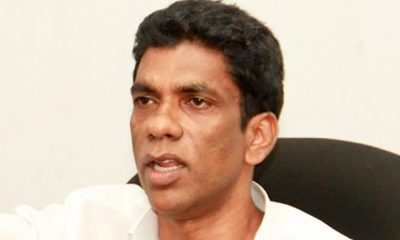
 Features5 days ago
Features5 days agoDigambaram draws a broad brush canvas of SL’s existing political situation




